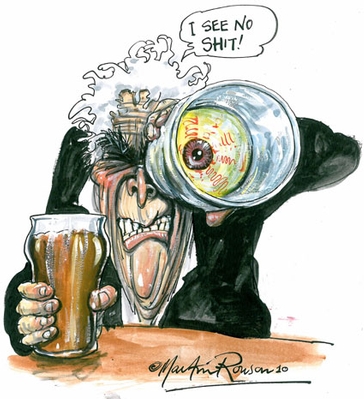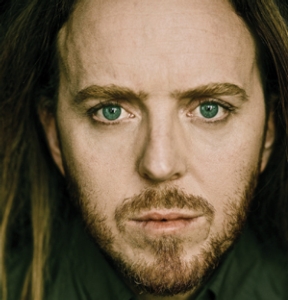As a committed rationalist, I’ve endeavoured over the years to rid myself of a range of personal irrationalities: the contention that a small number of chocolate bars can form part of a calorie-controlled diet; the assumption that the death of my 30-a-day maternal grandmother at the age of 92 provides me with genetic immunity from lung cancer; the belief that if I’d only had more time left over from watching lower league football on satellite television I could readily have made a substantial contribution to the higher reaches of social theory.
But there is one sticking point in this otherwise straightforward march of reason, one glaring irrationality that I’m simply unable to dispel. No matter how hard I argue with myself I’m quite unable to abandon the questionable notion that some of the finest moments of my life might not have occurred if at the time I’d been stone cold sober.
Could it really be, for example, that I’d have fared just as well with Susan Hickey at the 1983 British Sociological Association Annual Conference in Swansea if I hadn’t first attracted her full attention by collapsing backwards over her table of drinks as I executed the final twirl in my improvised rendition of Kate Bush’s dancing style?
And is it really rational to conclude that back in the early ’90s I could have become best friends with such an apparently dry, austere fish as Robert Cruddas if we hadn’t found ourselves staying together in a Leicester B&B where the only entertainment possible apart from going out to watch the streetlights change was the bottle of Teacher’s I’d just won in the British Association of Social Workers annual raffle?
And although I don’t want to overload the dice of unreason, I must wonder if I might ever have won the undying respect of one of Britain’s leading cultural commentators if I hadn’t one night on holiday on the Italian island of Giglio decided to leap off the edge of a cliff for no other reason than his repeated assurance that somewhere down there lay the warm Mediterranean. (I still remember how his siren call of “You daft bastard” ricocheted around the surrounding cliffs as I hurtled down through the thick darkness to the leaden sea below.)
What currently makes me so eager to compile this inventory of drunken achievement is an extraordinary conjunction: separate meetings in the course of a month with two people who were only too ready to challenge my lifetime belief in the social and cultural benefits that flow from periodic drunkenness.
First up was Will Self. In the course of an extended interview with him for Sky Arts, I brought up the subject of his current abstinence, regaled him with a few of the social losses that he must have incurred by choosing a life of total sobriety. His patient response suggested that I wasn’t the first drunk to rattle his cage this way. Yes, he said, when you’re a drinker you do presume that the world teems with alcohol. Like the drunk in the American cartoon you look around and see skyscrapers that resemble spirit bottles, traffic lights that are dead ringers for optics. But when you stop drinking, this alcoholic haze gradually clears and you see the world in a different way. You realise there are hundreds of good, exciting, original people who never touch a drop and are just waiting to be your new friends. You enter a different world.
 Only a month after this interview I found myself on stage at the Daphne Du Maurier Festival in Fowey talking to Anthony Grayling abut his philosophy of life. Will Self’s words must have been still tiptoeing around my brain because instead of probing Anthony relentlessly on such matters as his ability to construct a moral code without recourse to religious edicts or on his current plans to publish an atheist Bible, I found myself asking about his drinking habits. “You don’t drink?” “No.” “No alcohol at all?” “No.” “Not a drop?” “Not a drop.”
Only a month after this interview I found myself on stage at the Daphne Du Maurier Festival in Fowey talking to Anthony Grayling abut his philosophy of life. Will Self’s words must have been still tiptoeing around my brain because instead of probing Anthony relentlessly on such matters as his ability to construct a moral code without recourse to religious edicts or on his current plans to publish an atheist Bible, I found myself asking about his drinking habits. “You don’t drink?” “No.” “No alcohol at all?” “No.” “Not a drop?” “Not a drop.”
“But,” I said, searching for a philosophical rejoinder and only coming up a with a time-bound banality, “how on earth do you manage to fill your evenings?”
“I work”, said Anthony. “Not drinking gives me five hours’ advantage over everyone else. Twice as much time to think and write. Twenty-five per cent more life.”
I’m still just about holding out. Even as reason was prompting me to such decisive action as not renewing the empty bottle of Jamesons on the sideboard, I found myself calling on my old friend Stan Cohen. With all the irritating fervour of a born-again I heard myself recounting the joys of sobriety that I’d so recently imbibed from my mentors. “And you know something else,” I said. “Without booze you can suddenly see reality for what it is.”
Stan looked at me. I could make out the pity in his eyes as he said, “Who the hell wants to see reality for what it is?”

